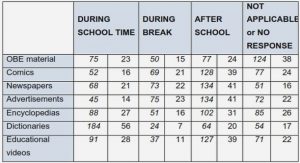Get Complete Project Material File(s) Now! »
Background to the Research Problem
For many decades, science and theology have accused each other of arrogance in their claims to know the truth. According to Polkinghorne & Welker (2000:6), in Western cultures, public expectation relies mainly on scientific procedures and not much, if indeed at all, on theology. Furthermore, people tend to seek answers to difficult and critical issues through scientific inquiry, despite the current crisis in scientific epistemology and a growing suspicion as to the actual benefits of much of technological progress. The common assumption in Western societies is that the measure and model for truth claims is found in the sciences.
Statement of the Research Question and how this Research Aims to Investigate it
This study will concern itself with the nature of the scientific dilemma, specifically regarding science’s failure to recognise Divine concurrence in the structure of the universe and creation itself. Although the study will centre on specific views, it will also engage the various positions taken by scholars on reality within the respective fields of theology and science.
Background to the Research Question
There is no doubt that the relations between science and faith are complex, as the following will attest to. From a religious perspective, it does seem that science usually negates faith as a way of solving issues, thus, in a way, rejecting a theistic view to understanding reality. Their modernistic approach is that scientific knowledge represents the sole cognitive entrance into what is real; the sole course of valid statements about what is the cause. Their argument is that science and science alone defines reality. As such, nature is as science defines it, and reality equals nature as defined by science.
Research Methodology
In terms of the research methodology, the author has opted for a literary study of authors – past and present – combining this with a dialogical and complementary method of research. The author believes that this would further improve the productive relationship which has, as previously referred to, been taking place between science and theology for some time now. The author also believes that researching results between the various methods used by science and theology in their exploration of reality will provide a more integrated assessment of both viewpoints. This should also make it easier to reach consonance, where necessary, on the topic of reality.
1 Introduction
1.1 Statement of the Problem: Different World-Views on Reality within Science and Theology
1.2 Background to the Research Problem
1.3 Statement of the Research Question and how this Research Aims to Investigate it
1.4 Background to the Research Question
1.5 Research Methodology
1.6 The Objective of the Research Methodology
1.7 The Context of the Research Problem
1.8 The Goals of this Research
1.9 The Effect of the Research Question on Science and Theology
1.10 Can one argue for the Existence of God from Nature and Science alone?
1.10.1 The Epistemological Argument
1.10.2 Metaphysical Arguments
1.10.2.1 Teleological Arguments
1.10.2.2 The Cosmological Arguments
1.10.2.3 The Ontological Arguments
1.10.3 Religious Experience Argument
1.10.4 Miracles Argument
1.11 Can Theology and Science Learn from Each Other?
2 Different World-Views Regarding Reality
2.1 Introduction
2.2 Categorising World-Views on Reality
2.3 The Basic Structure of World-Views
2.4 The Context of the Problem
2.5 The Value of Science to Theology?
2.6 Religious Gaps
2.7 The God Who Intervenes
2.8 The Dialogue Partners
2.9 Critical Realism
2.10 An Alternative Model from Theology
2.11 Introducing Metaphysics
2.12 An Approach to Problems of Knowledge
2.13 The Question of God
2.14 Differing Metaphysical Systems
2.14.1 Pantheism and Panentheism
2.14.2 Agnosticism
2.14.3 Rationalism
2.14.4 Experientialism
2.14.5 Evidentialism
2.14.6 Pragmatism
2.15 A Theistic World-View, the only likely alternative?
2.16 Theism Gainsays Deism and Atheism
2.16.1 Deism
2.16.2 Atheism
2.17 Conclusion
3 Historical and Biological Deism
3.1 Introduction
3.2 Creation and Evolution, the Great Divide
3.3 Theology and Science, the Great Divide
3.4 The Creation Evolution Dilemma
3.5 The Heart of Darwin’s Theory
3.6 Does Theology need Evolutionary Theory?
3.7 Scientific and Metaphysical Theories regarding the Creation of the Universe 108
3.8 The Biblical Idea of Creation
3.8.1 Genesis Chapters 1-11: Truth or Myth?
3.8.2 The Creation
3.8.3 Continuous Creation “creatio continua”
3.8.4 Creation Contingency and Process Theism
3.9 The First and Second Laws of Thermodynamics and their Relation to Creation
3.10 Conclusion
4 Open Theism, Determinism, and the Sovereignty and Omniscience of God
4.1 Introduction
4.2 Background to the Problem
4.3 Introducing Open-Theism
4.4 Process Theology and its influence on Open Theism
4.5 The Major Elements of a World View
4.5.1 God
4.5.2 Ultimate Reality
4.5.3 Knowledge
4.5.4 Ethics
4.5.5 Humankind
4.6 Modernism, Postmodernism, and the Self
4.6.1 Christian Modernism
4.6 2 Postmodernism and Christianity
4.7 Relating Christianity to the Changing Times
4.8 God, the Reality-Constructor
4.9 Deconstructing Open Theism
4.10 God’s Infinity and His Omniscience
4.11 God and Determinism
4.12 Open Theism’s Diminished God
4.13 The Test of Open Theism
4.14 Conclusion
5 God’s Providence and its relation to Prayer, Healing,Personhood and Sin
5.1 Introduction
5.2 Providence in Prayer and Healing
5.3 Historical Aspects of Prayer and Medicine
5.4 Does Prayer Work?
5.5 Psychology and Prayer
5.6 God’s Actions
5.7 Bottom-up Causality
5.8 Is Prayer only a Means of Inward Change?
5.9 God Nature and the Miraculous
5.10 Personhood, and Human Freedom
5.11 Freedom and Sin
5.12 God’s Providence and the Sinful Acts of Humanity
5.13 Conclusion
6 Shaping Eschatology within Science and Theology
6.1 Introduction
6.2 A Scientific Model of Eschatology
6.3 A Theistic View of Eschatology
6.4 Time and Eternity: It’s Relationship to Eschatology
6.4.1 The Complexities of Time
6.4.2 Time, Death and Eternity
6.5 Reconciling the Two Views
6.6 Summary of Argumentation
Bibliography
GET THE COMPLETE PROJECT
UNDERSTANDING REALITY: EXPLORING THE INTERACTION BETWEEN THEOLOGY AND SCIENCE, WITH SPECIAL REFERENCE TO A THEISTIC PRESUPPOSITION TO CERTAIN WORLDVIEWS





